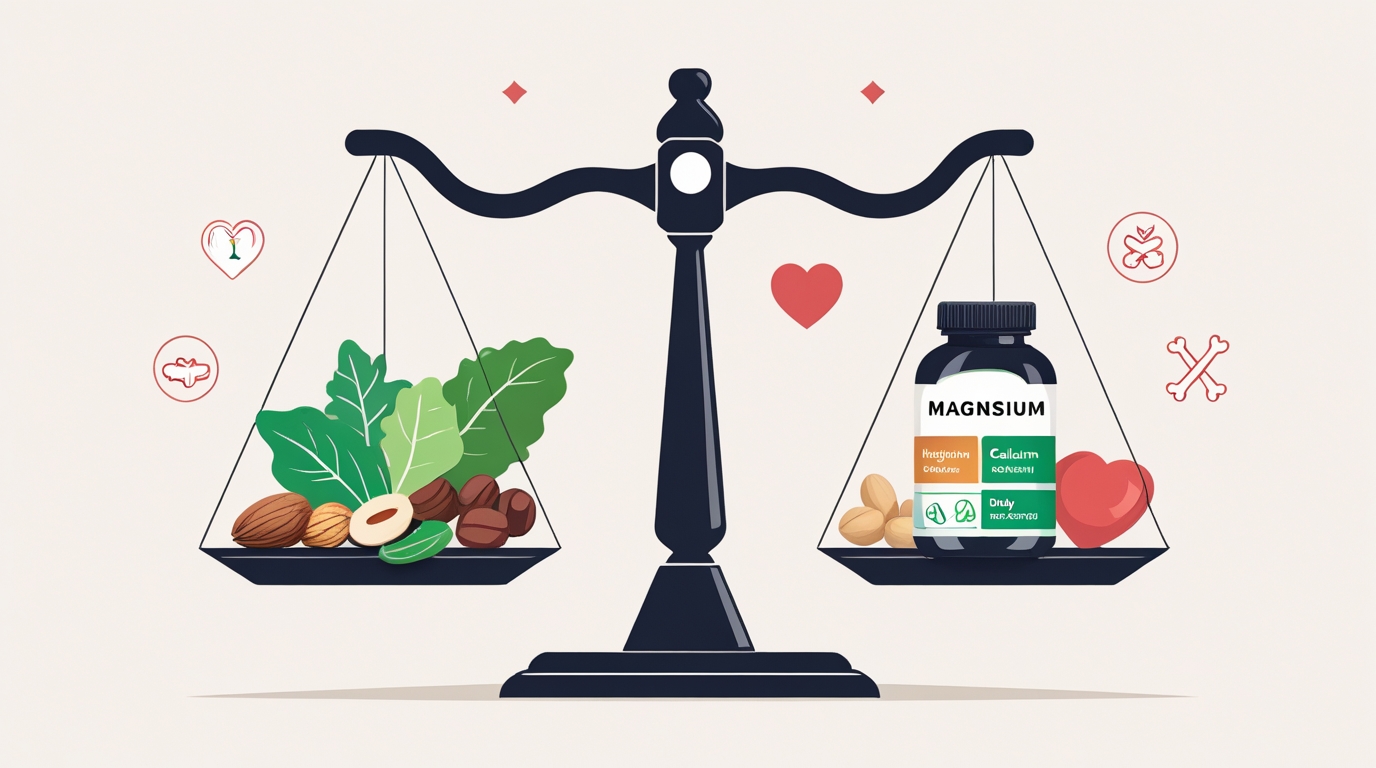Magnesium vs. calcium: Which does your body need more? Although both minerals are essential, the key to optimizing your health is understanding how they function and identifying which one your body may be lacking. With a focus on the needs of Americans, this comprehensive guide breaks down the differences, benefits, recommended intake, signs of deficiency, and the best sources of each mineral.
Why Magnesium vs. Calcium Matters for Your Health
Calcium and magnesium are both essential for preserving the proper operation of your body. Strong bones and teeth, nerve transmission, and heart function are all supported by calcium. On the other hand, magnesium is necessary for blood sugar management, muscle and nerve function, and more than 300 enzymatic reactions.
While excessive amounts of one mineral can sometimes interfere with the absorption of the other, a deficiency in either can lead to serious health issues. Maintaining a proper balance between the two is essential for optimal health.
Related: Magnesium Deficiency in the United States
Key Functions of Magnesium and Calcium
Magnesium
- Supports muscle and nerve function
- Regulates blood pressure and blood sugar
- Aids in energy production
- Helps in bone formation
Calcium
- Strengthens bones and teeth
- Supports muscle contraction
- Aids blood clotting
- Promotes nerve signaling
Daily Recommended Intake
Magnesium (According to NIH):
- Adult men: 400–420 mg/day
- Adult women: 310–320 mg/day
Calcium:
- Adults: 1,000–1,200 mg/day
Muscle cramps, kidney stones, and calcification of soft tissues and arteries can result from an excess of calcium and insufficient magnesium.
Common Signs of Deficiency
- Muscle cramps or twitches
- Fatigue or weakness
- Anxiety or mood issues
- Irregular heartbeat
Calcium Deficiency:
- Brittle nails and bones
- Muscle spasms
- Poor dental health
- Numbness or tingling in fingers
👉 Related: Magnesium-Rich Foods in the United States
Best Food Sources
Magnesium-Rich Foods:
- Spinach
- Pumpkin seeds
- Almonds
- Black beans
- Avocados
🛒 Buy Magnesium Supplements on Amazon
Calcium-Rich Foods:
- Dairy products (milk, cheese, yogurt)
- Kale
- Sardines
- Fortified cereals
- Broccoli
🛒 Shop Calcium Supplements on Amazon
Magnesium vs. Calcium: Finding the Right Balance
While calcium is often emphasized for bone health, magnesium helps control calcium levels and ensures it is properly absorbed. An imbalance—particularly too much calcium and too little magnesium—can result in long-term health concerns.
Yes, however, to prevent absorption issues, it’s crucial to maintain a healthy calcium-to-magnesium ratio, ideally 1:1 or 2:1.
Due to bad eating habits and a lack of nutritious foods, many Americans have enough calcium but are magnesium deficient.
In fact, studies suggest that a magnesium deficiency can make it harder for your body to regulate calcium levels, potentially leading to issues such as artery stiffness and high blood pressure.
A growing body of evidence also shows that excessive calcium supplementation, without balancing magnesium, may increase the risk of cardiovascular disease. This makes it even more important to pay attention to the ratio of these two minerals.
Related: Magnesium Deficiency in the United States
Expert Insight
According to the National Institutes of Health (NIH), getting essential minerals like magnesium and calcium from food sources is the most effective and safest strategy for long-term health.
FAQs: Magnesium vs. Calcium
Q1: Can I take magnesium and calcium together?
Yes, however, to prevent absorption issues, it’s crucial to maintain a healthy calcium-to-magnesium ratio, ideally 1:1 or 2:1.
Q2: What causes an imbalance?
Extra calcium supplementation, a bad diet, certain drugs, or illnesses such as Crohn’s disease.
Q3: Which mineral is better for anxiety?
It has been demonstrated that magnesium helps regulate mood and lessens the symptoms of anxiety.
Q4: Should I rely on supplements?
Although whole meals are best, if you’re lacking in any of these nutrients, supplements may be helpful; just speak with your doctor first.
Q5: Does age affect magnesium and calcium needs?
Although older adults may need extra calcium to support bone density, they should also monitor their magnesium intake to support absorption and maintain proper balance.
Conclusion: Achieving the Right Magnesium and Calcium Balance
Balance is key when it comes to magnesium and calcium; it’s not about picking one over the other. Although most Americans consume too little magnesium and too much calcium, both minerals are essential. Aim to eat more foods high in magnesium, avoid taking too many calcium supplements, and get individual guidance from a healthcare professional to support your health.
Call to Action
Ready to improve your mineral balance? Start by adding more magnesium- and calcium-rich foods to your meals today. Browse high-quality supplements on Amazon if dietary intake isn’t enough, and don’t forget to share this article to help others stay informed.
Disclaimer
This content is for informational purposes only. It is not intended as medical advice, diagnosis, or treatment. Please consult your healthcare provider before making changes to your supplement or dietary routine.
Written by the team at FitFusionBlogs — your go-to source for balanced health and wellness advice tailored for American lifestyles.

